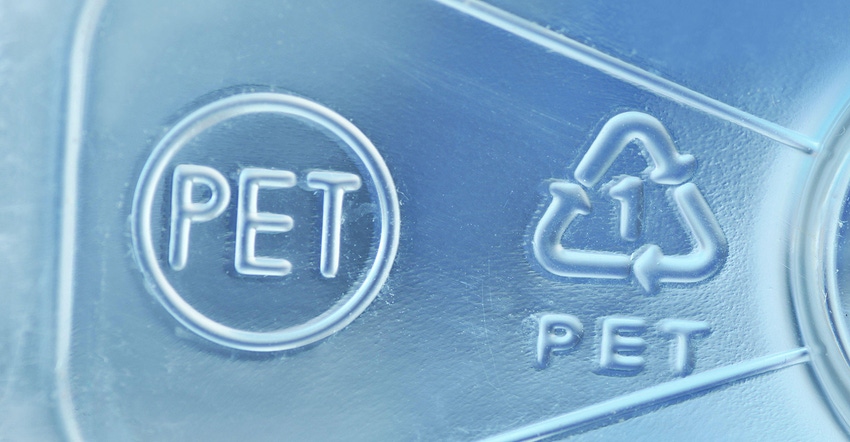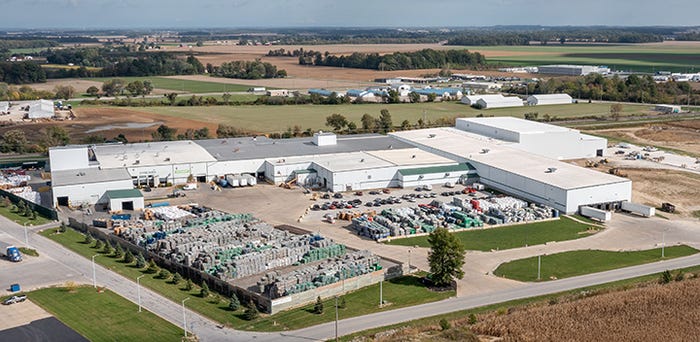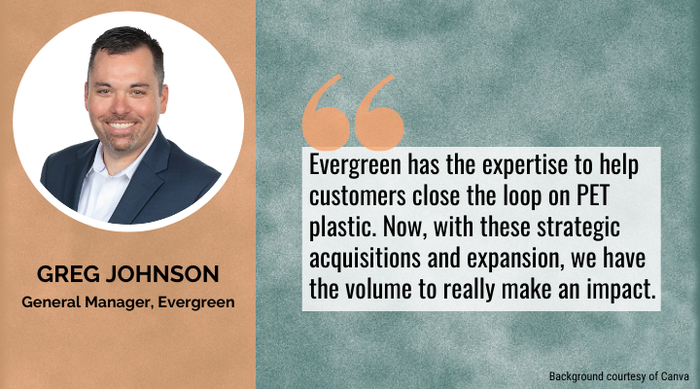Acquisitions and expansions enable the company to increase food-grade rPET production, and technology is streamlining its recycling operations.
February 9, 2022

Thanks to an enterprising acquisition strategy, Clyde, OH-based plastics recycler and manufacturer Evergreen is emerging as a leading producer of food-grade recycled polyethylene terephthalate (rPET) — even as it increases its PET-bottle recycling capacity.
Evergreen, owned by The Sterling Group, Houston, acquired UltrePET and Novapet from wTe in November 2021. The acquisitions boosted Evergreen’s annual production of rPET from 40 million pounds one year ago to more than 147 million pounds currently. According to Evergreen, the company is now one of North America’s three largest producers of food-grade rPET.
With the acquisitions, the company has grown from one location in January 2021 to four North American locations currently. The four are Clyde, the original facility; Albany, NY; Amherst, Nova Scotia; and Riverside, California, which Evergreen acquired from CarbonLite in mid-2021.

Evergreen is also implementing a significant upgrade at its Clyde facility (shown above), adding a 54,000 sq ft building to its existing 238,000 sq ft facility. The new building will house four high-volume food-grade rPET manufacturing lines. Evergreen expects to complete the Clyde expansion in June 2022, bringing its annual rPET production capacity to 217 million pounds
The supply increase is well timed due to increased demand for rPET in North America. Recycled PET has become increasingly popular as consumer packaged goods companies seek sustainable alternatives to virgin resins for beverage bottles, food containers, health and beauty packaging, home products, and more.
The 2020 PET Recycling Report from the National Association for PET Container Resources (NAPCOR) noted a 10% increase in end-use consumption of rPET in the United States and Canada between 2019 and 2020. The report also revealed that the use of rPET in the food/beverage and non-food/beverage bottle categories grew 32% in 2020, and that US and Canadian rPET consumption grew from 1 billion to 1.8 billion pounds between 2010 and 2020.

“The world has reached a tipping point where recycling and the use of recycled content aren’t just ‘nice’ to do — consumers and companies agree we have to do these things to lessen our impact on the environment,” said Evergreen general manager Greg Johnson in a prepared statement. “As a plastics recycler and producer of rPET for more than two decades, Evergreen has the expertise to help customers close the loop on PET plastic. Now, with these strategic acquisitions and expansion, we have the volume to really make an impact.”
On the recycling side of its business, Evergreen has increased the number of post-consumer PET bottles it collects and recycles. In January 2021, the company’s recycling rate for PET bottles was about 2 billion per year. In a little over a year, that number grew to 11.6 billion. The company uses AI-enabled robots that sort PET bottles from moving waste streams up to three times faster, and more accurately, than human sorters can.
“America’s beverage companies are carefully designing our bottles to be 100% recyclable, and we want them all back so they can be remade into new bottles, as intended,” said Megan Daum, vice president of sustainability at the American Beverage Association (ABA), a trade organization for companies that make and distribute non-alcohol beverages in the United States.
In 2021, Evergreen received a $5 million investment from ABA and Closed Loop Partners as part of the beverage industry’s Every Bottle Back initiative.
“Increasing the use of post-consumer recycled material in our bottles is a top priority of our industry, which is why we’re making critical investments in recycling infrastructure,” like the investment in Evergreen, Daum said. “Public-private partnerships like these are essential in driving solutions to close the loop on our bottles and reduce the use of new plastic.”
You May Also Like


